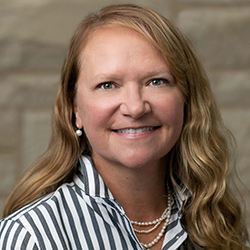One McCormick Lecture Highlights Promotion of Student Mental Health
Jill Wilson and Marita Labedz Poll discussed training for faculty and staff
Two programs at Northwestern Engineering that support student mental health while aiming to remove stigma around getting help were the focus of the latest One McCormick lecture.
The Mental Health Allies (MHA) and Responding to Students in Distress (RSD) programs were developed to educate McCormick School of Engineering faculty and staff how to serve as concerned listeners to students facing mental health challenges, and to quickly and directly guide them to appropriate services.

Jill Wilson, Charles Deering McCormick Distinguished Professor of Instruction and assistant chair of the industrial engineering and management sciences department (IEMS), and Marita Labedz Poll, IEMS senior academic adviser discussed the programs during the lunchtime lecture on Friday, April 16.
“We want members of our community to understand when and exactly how to refer students for support,” Poll said.
RSD, a 90-minute workshop first offered in the spring of 2019, teaches best responses to students in crisis. In an effort to provide ongoing support for students around mental health, Poll developed the MHA program. First offered in December 2019, the four-and-a-half hour training session goes more in depth, empowering faculty and staff to identify students in distress and crisis, engaging with them, then referring them to campus resources.
The need is greater than ever.
In 2019, a National College Health Assessment survey revealed that 33 percent of college students reported being diagnosed or treated with a mental health condition in the past year, with anxiety and depression the most common. Also, 71 percent of students in the prior year felt “very sad,” while two-thirds felt lonely or overwhelming anxiety, and 13 percent had serious thoughts of suicide.
 The isolation caused by the coronavirus pandemic has exacerbated mental health challenges. A College Pulse survey in 2020 reported that more than 20 percent of students reported constant anxiety about the pandemic. Meanwhile, Active Minds, which works to positively help young adults’ mental health, reported that 80 percent of college students’ mental health was negatively impacted because of COVID-19, and 20 percent said their mental health worsened significantly.
The isolation caused by the coronavirus pandemic has exacerbated mental health challenges. A College Pulse survey in 2020 reported that more than 20 percent of students reported constant anxiety about the pandemic. Meanwhile, Active Minds, which works to positively help young adults’ mental health, reported that 80 percent of college students’ mental health was negatively impacted because of COVID-19, and 20 percent said their mental health worsened significantly.
“We all have experienced how that’s impacted our productivity and our ability to synthesize new information,” Wilson said. “If we put ourselves in the shoes of our students and think about their attempts to learn and manage their home circumstances and continue towards their success, this is really impactful for them.”
MHA training continued during the pandemic, but focused on how to “virtually” walk a student to the Northwestern Counseling and Psychological Services (CAPS), Poll said.
“We did respond to our current environment. We certainly can’t ignore that. We wanted to provide the mental health allies with that new information given our current circumstances,” Poll said. “If a student is halfway across the world, what do you do?”
The One McCormick series will continue Wednesday, April 28, with “McCormick Student Groups and Student Life,” a presentation by assistant dean for student affairs Ellen Worsdall.